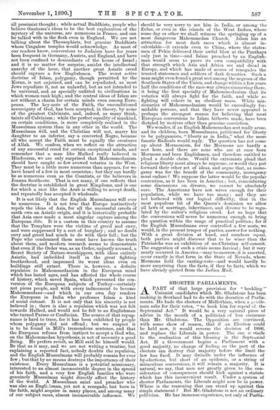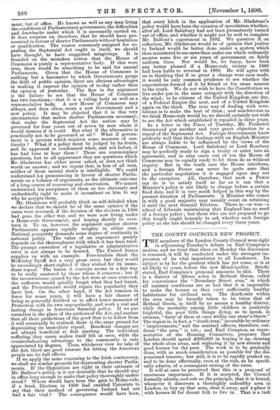SHORTER PARLT A VENTS.
APART of that large provision for " heckling " Unionist candidates which Mr. Gladstone has been making in Scotland had to do with the duration of Parlia- ments. He bade the electors of Midlothian, when a gentle- man asks for their votes, " to book him for repeal of the Septennial Act." It would be a very natural piece of advice in the mouth of a politician of less eminence than Mr. Gladstone. The Opposition are convinced, with some show of reason, that if an Election could be held now, it would reverse the decision of 1886, and replace the Liberals in power. The one or qtacle to the realisation of this blessing is the Septennial Act. If a Government begins a Parliament with a good majority, no change of feeling on the part of the electors can destroy that majority before the limit the law has fixed. It may dwindle under the influence of by-elections, but short of an epidemic, or a string of miraculous conversions, it will remain a majority. It is natural, we say, that men not greatly given to the con- sideration of consequences should kick against a statute which has this inconvenient result. Under a system of shorter Parliaments, the Liberals might now be in power. Where is the reasoning that can stand up against this simple statement ? But Mr. Gladstone is not an ordinary politician. He has immense experience, not only of Parlia- ment, but of office. He knows as well as any man living the conditions of Parliamentary government, the difficulties and drawbacks under which it is necessarily carried on.
It does surprise us, therefore, that he should have pro- nounced in favour of shorter Parliaments without hesitation or qualification. The reason commonly assigned for re- pealing the Septennial Act ought in itself, we should have thought, to have suggested misgivings. It is founded on the mistaken notion that the House of Commons is purely a representative body. If this were true, there would be something to be said for annual Parliaments. Given that the House of Commons is nothing but a barometer by which Governments gauge the drift of public opinion, there are obvious advantages in making it express the opinion of to-day rather than the opinion of yesterday. The flaw in the argument is the failure to see that the House of Commons has two functions,—that it is a ruling body as well as a representative body. A new House of Commons may always, and does often, mean a new Government and a new policy. It may be objected that it is this very -circumstance that makes shorter Parliaments necessary; that under the Septennial Act the nation may be governed for four years out of seven by men whom it would dismiss if it could. But what if the alternative is practically not to be governed at all ? What if govern- ment is a process which requires some measure of con- tinuity ? What if a policy must be judged by its fruits, and be approved or condemned when, and not before, it has had time to bear them ? These are commonplace questions, but to all appearance they are questions which Mr. Gladstone has either never asked, or does not think worth an answer ; and we repeat that, in him of all men, neither of these mental states is intelligible. We could understand his pronouncing in favour of shorter Parlia- ments on a balance of arguments, as the ultimate outcome of a long course of reasoning and observation. We cannot understand his acceptance of them as too obviously and undoubtedly right to make it incumbent on him to say why he accepts them. Mr. Gladstone will probably think us self-deluded when we declare that we should be of the same opinion if the cases were reversed, if the decision of the electors in 1886 had gone the other way, and we were now living under --a Home-rule Government, and hoping shortly to over- turn it. To us, however, the argument against shorter Parliaments appears equally weighty in either case. National prosperity demands some degree of continuity in _national policy. The value of an experiment greatly -depends on the thoroughness with which it has been tried. The prompt correction of a legislative or administrative error is not always to be desired. The United States supplies us with an example. Free-traders think the McKinley Tariff Act a very great error, but they would be exceedingly short-sighted if they wished for its imme- diate repeal. The lesson it conveys seems in a fair way to be really mastered by those whom it concerns ; but if -the inconvenience caused by the Act were at once removed, the sufferers would quickly forget what they had learnt, and the Protectionists would regain the popularity they ..have lost. On the other hand, if the Act remains in force for some years, it will have a fair chance of being so generally disliked as to affect lesser measures of Protection with its own unpopularity, and work a real and lasting change in American financial policy. If we put ourselves in the place of the authors of the Act, and assume that all their predictions of the good that is to follow from . it will eventually be realised, there is the same ground for deprecating its immediate repeal. Beneficial changes are not always beneficial at first starting. The individual . suffering they cause makes itself felt at once, while the counterbalancing advantage to the community is only ,appreciated by degrees. Thus, whichever view we take of the Act, there are good reasons for letting the American people see its full effects. If we apply the same reasoning to the Irish controversy, we shall see similar grounds for deprecating shorter Parlia- ments. If the Opposition are right in their estimate of Mr. Balfour's policy, is it not desirable that he should stay in office long enough to make that policy thoroughly under- stood ? Where would have been the gain to Home-rule, if a fresh Election in 1889 had enabled Unionists to say that their method of governing Ireland had not had a fair trial ? The consequence would have been, that every hitch in the application of Mr. Gladstone's policy would have been the occasion of speculation whether, after all, Lord Salisbury had not been prematurely turned out of office, and whether it might not be well to complete Mr. Balfour's experiment in 1892. We question if, on reflection, Mr. Gladstone would be of opinion that justice to Ireland would be better done under a system which thus ministered to see-saws than under one which ordinarily secures some five or six years of government on fairly uniform lines. Nor would he, we fancy, have been any better pleased if a Home-rule victory in 1886 had been liable to reversal in 1889. He will agree with us in thinking that if so great a change were once made, it would be only common prudence to see whether the expectations formed of it by friend or foe came nearest to the truth. We do not wish to have the Constitution we live under put in the same category with the direction of the wind ; to be citizens of the United Kingdom one day, of a Federal Empire the next, and of a United Kingdom again on the third. The true way of dealing with revo- lutions is to make the best of them ; and mischievous as we think Home-rule would be, we should certainly not wish to see the Act which established it repealed in three years.
In a letter in the Times of Tuesday, Mr. Frederick Greenwood put another and very grave objection to a repeal of the Septennial Act. Foreign Governments know perfectly well that their dealings with an English Minister are always liable to be influenced by the views of the House of Commons. Lord Salisbury or Lord Rosebery may be perfectly ready to sign a treaty or enter into an agreement, and in nine cases out of ten the House of Commons may be equally ready to let them do so without inquiry. But in the tenth case the House interferes, and a foreign Power can never be quite sure that the particular negotiation it is engaged upon may not be the exception. All, therefore, that such a Power can do is to satisfy itself so far as it can that a Minister's policy is not likely to change before a certain fixed date, and it is very much helped in this way by the present duration of Parliaments. A Minister who comes in with a good majority may usually count on retaining it until the next General Election. There is—or was—a school of Liberals maintaining that England has no need of a foreign policy ; but those who are not prepared to go this length ought honestly to ask whether such foreign policy as she has should be changed every three years.



















































 Previous page
Previous page